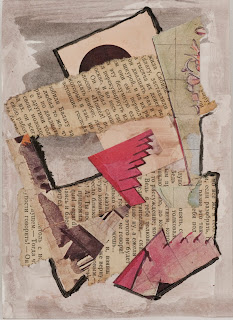 What makes a "classic" a classic? I should remember this from my college days when I studied Russian literature. There was something about timelessness, right? I was reading an article about honeybees and colony collapse disorder, and it was prefaced by the following quote from Leo Tolstoy himself, "The closer we examine the honeybee, the more we realize the workings of a beehive encompass territories beyond our comprehension."
What makes a "classic" a classic? I should remember this from my college days when I studied Russian literature. There was something about timelessness, right? I was reading an article about honeybees and colony collapse disorder, and it was prefaced by the following quote from Leo Tolstoy himself, "The closer we examine the honeybee, the more we realize the workings of a beehive encompass territories beyond our comprehension."What an amazing human being.-- Lola
Lola Baltzell
from page 33-34, Volume II of original text
collage, acrylic paint, ink
made 2/18/11
page 625-627 Pevear/Volokhonsky translation




























